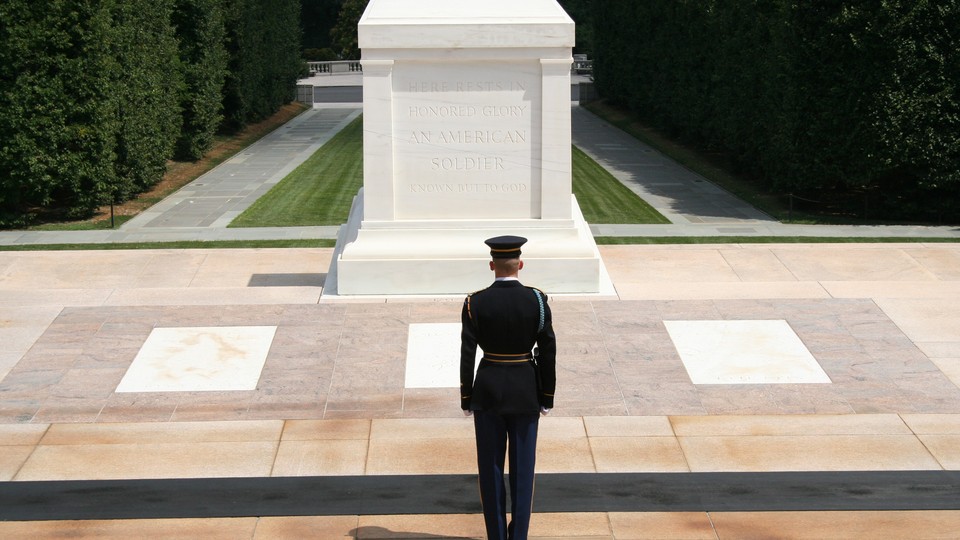What Trump Doesn’t Understand About the Military
9 min read
This is an edition of The Atlantic Daily, a newsletter that guides you through the biggest stories of the day, helps you discover new ideas, and recommends the best in culture. Sign up for it here.
Donald Trump has disgraced himself in many areas. But his longevity in public life after expressing open contempt for the men and women of the United States military, and especially those who have been wounded or killed in the service of their country, is an appalling achievement unmatched by any of his predecessors.
Atlantic editor in chief Jeffrey Goldberg has written several important articles about Trump and his relationship with the military—he broke the story about Trump referring to America’s fallen soldiers as “losers” and “suckers”—and that reporting has now been gathered into a book for Atlantic Editions titled On Heroism.
I talked with Jeff over the holiday weekend about the book, and about how America has become so tolerant of a politician who regularly shows his disdain for the U.S. military.
Tom Nichols: When I started reading this, I wondered about the title, which is about heroism, but really, so much of what you talk about here is the problem Trump has with honor, isn’t it?
Jeffrey Goldberg: Well, yes. Damn it. Now we have to change the title.
Tom: Too late. But how do you see the difference between them?
Jeff: Many people are honorable, but to me, any who have run toward the fire, the people who put themselves in danger for others, are committing acts of genuine heroism. At the very least, we think of them as selfless or brave, and in the book, I talk about people who have shown that kind of valor: John McCain is the most obvious example, along with General John Kelly, General Mark Milley, and others. And Trump has attacked all of them, even calling some of them traitors.
Tom: Is he intimidated by them? It seems to me that honorable people aggravate and confuse Trump, but heroic people really seem to disgust him in some way, especially wounded warriors. I mean, he seems to hate McCain even more than some of his political enemies who are still alive.
Jeff: That’s why I wrote about heroism. It’s a quality we all value, but Trump actually seems jealous of people who have committed acts of genuine heroism, and so he demeans them. And I think it might even be more than jealousy; it’s also cowardice. Somewhere deep inside him, maybe he has just enough self-knowledge to know that he himself would not be capable of such acts, and that realization makes him angry.
Tom: As you were saying that, I was thinking of him bragging about how he would have run right into the Parkland school back in 2018—without a weapon!—to take out the shooter. Almost like he was trying to convince himself.
Jeff: You have to wonder about anyone who says that. You don’t really know what you would do in that situation. No one does. But he felt he had to say it. He reacted defiantly when he was shot at in July, but that’s not a situation he volunteered for, and it’s definitely not a moment that called for selflessness or self-sacrifice. Even while he’s talking about what a hero he’d have been at Parkland, he has always had this inability to understand people who risk their lives, much like he couldn’t understand the men who didn’t claim they had bone spurs and get out of being sent to Vietnam.
Tom: Well, other people of his generation got deferments too. But he seems almost gleeful, like he put one over on the guys who served. It’s like his apparent belief that only idiots pay their taxes.
Jeff: Yes, it’s a very Leona Helmsley attitude that societal obligations are for the little people. It’s even more than Trump failing the binary choice between cowardice and heroism; it’s also about selflessness and selfishness. And one thing you don’t want in a president is selfishness.
Tom: “What was in it for them?”
Jeff: Right. And remember, that question—“What was in it for them?”—is even worse because he said it to General Kelly in Arlington National Cemetery, literally standing at the grave site of Kelly’s son, a fallen Marine first lieutenant. To me, that moment really shows how his instincts are so unnatural: His immediate inclination in such situations is to disparage the people who served, to talk about how dishonorable it is for someone like John McCain to be captured. He did it to George H. W. Bush too. Bush was one of the youngest pilots in the Navy, and Trump called him a “loser” because he was shot down over the Pacific.
Tom: Are we at the part where we ask why?
Jeff: I’ve spent a lot of time trying to figure out the kind of person who has such thoughts. You can explain some of it by just accepting who Trump is: He’s a huckster, a con man, and what do all con men have in common? Contempt for the mark. In Trump’s case, everyone is the mark, so he has this contempt for all people, including his own supporters. But ultimately that’s not the issue, and at this point, we don’t have to sit around trying to understand the deep currents that cause him to think this way.
The man was president, and he wants to be president again. The record is plain. This is the truth of Donald Trump: He has contempt for men and women who serve their country.
Tom: Okay, psychoanalyzing Trump is a job for professionals, but how is it that more people are not appalled by this? The one thing that unites most Americans is respect for the people who serve the nation in the military.
Jeff: You’ve asked what is, to me, the most mysterious question. It’s not “Why is Donald Trump this way?” but “How could Trump say the things he said even back in 2015 and not immediately be driven from the Republican Party by its own voters?” What happened in our country that allowed someone to insult a hero, a POW who was tortured for years, and then survive and thrive in American politics?
Tom: And?
Jeff: Well, one answer is that you have to remember that Trump and his people regularly engage in concerted campaigns to deny that Trump ever said any of these things. They went especially hard after the revelations about him referring to the dead as “suckers” and “losers” and claimed that it was all fabricated, despite Kelly confirming it. That’s another amazing part of all this, by the way: John Kelly, Gold Star father, Marine four-star general, combat veteran, is disbelieved over Donald Trump, who has been proven again and again to be a liar. It really shows how central it is to Trumpism to deny the realities of Donald Trump.
Tom: But no one denies what he said about John McCain, right? That’s on video and he’s pretty proud of it.
Jeff: The McCain comments are the hardest ones for me to explain, in part because I am a great admirer of McCain’s, and I have a hard time imagining how anyone, regardless of their politics, could see McCain as anything but the apotheosis of bravery. But also because that one incident really undid my understanding of American politics.
Tom: How so?
Jeff: If you could count on anything in America, and especially in Republican politics—if you had a list titled “Things Republican Candidates Cannot Do”—I think “insulting war heroes” would be near the top of that list. Our society venerates combat heroes. Trump very often treats them with open contempt. Just think about how he has repeatedly demeaned wounded veterans, demanding that they be kept out of parades, out of his sight. And yet Republicans have nominated him for president three times. I still cannot adequately explain it.
Related:
- The patriot: How Mark Milley held the line
- Trump: Americans who died in war are “losers” and “suckers.”
Here are four new stories from The Atlantic:
- What awaits a Harris presidency
- The women Trump is winning
- Donald Trump claims schools are offering sex-change operations.
- Why it’s so hard to know what to do with your baby
Today’s News
- Russian missiles hit a military academy and a nearby hospital in the Ukrainian city of Poltava, killing dozens and injuring hundreds, according to Ukrainian President Volodymyr Zelensky.
- Linda Sun, a former deputy chief of staff to New York Governor Kathy Hochul, was arrested and charged with acting as an illegal foreign agent for China.
- When asked yesterday if Israeli Prime Minister Benjamin Netanyahu was doing enough to secure the release of hostages in Gaza, President Joe Biden said no. Biden’s criticism comes after recent mass protests in Israel targeting Netanyahu over the bodies of six hostages discovered in Gaza.
Dispatches
- The Weekly Planet: The U.S. could sink billions into curbing emissions without altering the fate of the places climate change affects most, Zoë Schlanger writes. It’s an example of America’s new climate delusion.
- The Wonder Reader: Many parents stay enmeshed in their children’s emotional life in college, for better or worse, Isabel Fattal writes.
Explore all of our newsletters here.
Evening Read

Turn Down the Streetlights
By Eric Scigliano
Years ago, I called the local electric and streetlight utility, Seattle City Light, to ask why the block around the corner was lit up like a sleep-deprivation torture cell. Then as now, seven high-powered LED lights, plus two on facing corners, blazed away—more than twice the usual allotment in this hilltop neighborhood of close-packed bungalows less than three miles from downtown Seattle.
“That’s because it’s a high-crime block,” the guy I reached told me.
How do you know that? I asked.
“Because it has so many lights.”
Read the full article.
More From The Atlantic
- The labyrinthine rules that created a housing crisis
- Franklin Foer: Hamas’s devastating murder of Hersh Goldberg-Polin
- Bipartisan criminal-justice reform is still very much alive.
Culture Break

Test the waters. Six Atlantic writers and editors share underrated hobbies that they recommend for anybody looking to try something new.
Read. The narrators in Rachel Kushner’s novels have always relied on swagger, Lily Meyer writes. But her latest book, Creation Lake, offers something different.
Play our daily crossword.
P.S.
I am a science-fiction nerd. Just as the music world has its Beatles people and its Elvis people—or did, in the prehistoric days of my youth—my world has Star Wars people and Star Trek people. I am, without a doubt, a Star Trek guy; I have nothing against the Star Wars fans, but much like Admiral Motti, I just find a lot of it to be pseudoreligious hokum. I’m also such a hopeless fan of the adventures of the starship U.S.S. Enterprise that I had a replica of the ship’s intercom unit on my office wall at the Naval War College.
I thought I had a pretty complete knowledge of Trek lore, but this summer, after a recommendation on social media, I found a set of books titled These Are the Voyages by Marc Cushman, and I recommend the first three, about the original series, to Trek nerds. If you are fascinated not only by Star Trek but by how television shows are made, especially in the 1960s, these books will mesmerize you. The Trek series creator, Gene Roddenberry, gave Cushman access to his records, including memos and notes, and over the years Cushman added even more research and interviews.
The level of detail is a delight, especially with regard to script rewrites and changes. (I especially loved how many famous writers were furious with Roddenberry’s control-freak editing.) Cushman also walks through production schedules and tells us what was going on in the world while the cast was filming. Interesting tidbit: In the days before VCRs and DVRs, if the cast had to work late, they would miss the airing of a show they’d already completed; some of them had to wait years until they could catch themselves in reruns.
He also presents reminiscences by the cast and crew, including about which shows they thought were great and which ones stunk. (Surprisingly, “Spock’s Brain” is remembered rather kindly.) He goes into the backstage dynamics—I learned that people didn’t hate Bill Shatner as much as the urban legends now have it—and he even explains how much each episode cost. The only drawback to the books? Each is the size of a cinder block.
— Tom
Stephanie Bai contributed to this newsletter.
When you buy a book using a link in this newsletter, we receive a commission. Thank you for supporting The Atlantic.



